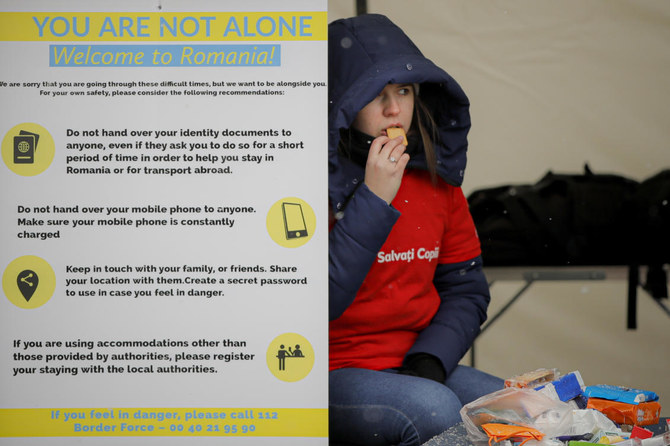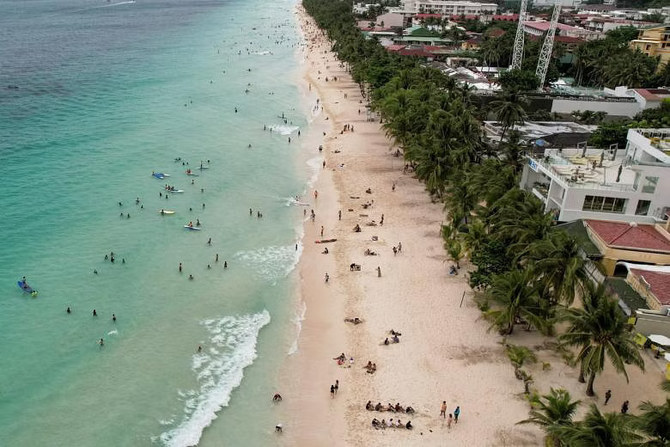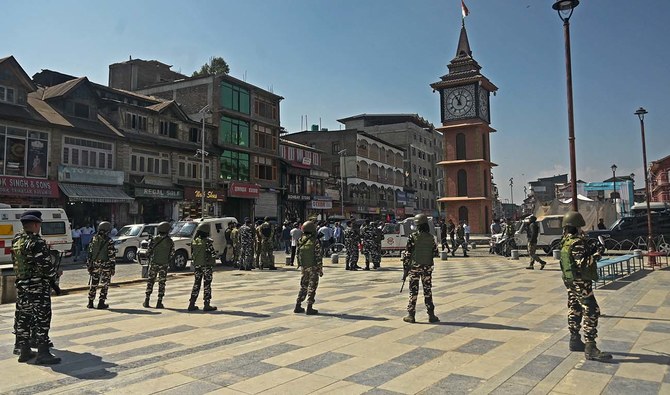SIRET: One man was detained in Poland suspected of raping a 19-year-old refugee he’d lured with offers of shelter after she fled war-torn Ukraine. Another was overheard promising work and a room to a 16-year-old girl before authorities intervened.
Another case inside a refugee camp at Poland’s Medyka border, raised suspicions when a man was offering help only to women and children. When questioned by police, he changed his story.
As millions of women and children flee across Ukraine’s borders in the face of Russian aggression, concerns are growing over how to protect the most vulnerable refugees from being targeted by human traffickers or becoming victims of other forms of exploitation.
“Obviously all the refugees are women and children,” said Joung-ah Ghedini-Williams, the UNHCR’s head of global communications, who has visited borders in Romania, Poland and Moldova.
“You have to worry about any potential risks for trafficking — but also exploitation, and sexual exploitation and abuse. These are the kinds of situations that people like traffickers … look to take advantage of,” she said.
The UN refugee agency says more than 2.5 million people, including more than a million children, have already fled war-torn Ukraine in what has become an unprecedented humanitarian crisis in Europe and its fastest exodus since World War II.
In countries throughout Europe, including the border nations of Romania, Poland, Hungary, Moldova and Slovakia, private citizens and volunteers have been greeting and offering help to those whose lives have been shattered by war. From free shelter to free transport to work opportunities and other forms of assistance — help isn’t far away.
But neither are the risks.
Police in Wrocław, Poland, said Thursday they detained a 49-year-old suspect on rape charges after he allegedly assaulted a 19-year-old Ukrainian refugee he lured with offers of help over the Internet. The suspect could face up to 12 years in prison for the “brutal crime,” authorities said.
“He met the girl by offering his help via an Internet portal,” police said in a statement. “She escaped from war-torn Ukraine, did not speak Polish. She trusted a man who promised to help and shelter her. Unfortunately, all this turned out to be deceitful manipulation.”
Police in Berlin warned women and children in a post on social media in Ukrainian and Russian against accepting offers of overnight stays, and urged them to report anything suspicious.
Tamara Barnett, director of operations at the Human Trafficking Foundation, a UK-based charity which grew out of the All Party Parliamentary Group on Human Trafficking, said that such a rapid, mass displacement of people could be a “recipe for disaster.”
“When you’ve suddenly got a huge cohort of really vulnerable people who need money and assistance immediately,” she said, “it’s sort of a breeding ground for exploitative situations and sexual exploitation. When I saw all these volunteers offering their houses … that flagged a worry in my head.”
The Migration Data Portal notes that humanitarian crises such as those associated with conflicts “can exacerbate pre-existing trafficking trends and give rise to new ones” and that traffickers can thrive on “the inability of families and communities to protect themselves and their children.”
Security officials in Romania and Poland told The Associated Press that plain-clothed intelligence officers were on the lookout for criminal elements. In the Romanian border town of Siret, authorities said men offering free rides to women have been sent away.
Human trafficking is a grave human rights violation and can involve a wide range of exploitative roles. From sexual exploitation — such as prostitution — to forced labor, from domestic slavery to organ removal, and forced criminality, it is often inflicted by traffickers through coercion and abuse of power.
A 2020 human trafficking report by the European Commission, the EU’s executive branch, estimates the annual global profit from the crime is 29.4 billion euros ($32 billion). It says that sexual exploitation is the most common form of human trafficking in the 27-nation bloc and that nearly three-quarters of all victims are female, with almost every fourth victim a child.
Madalina Mocan, committee director at ProTECT, an organization that brings together 21 anti-trafficking groups, said there are “already worrying signs,” with some refugees being offered shelter in exchange for services such as cleaning and babysitting, which could lead to exploitation.
“There will be attempts of traffickers trying to take victims from Ukraine across the border. Women and children are vulnerable, especially those that do not have connections — family, friends, other networks of support,” she said, adding that continued conflict will mean “more and more vulnerable people” reaching the borders.
At the train station in the Hungarian border town of Zahony, 25-year-old Dayrina Kneziva arrived from Kyiv with her childhood friend. Fleeing a war zone, Kneziva said, left them little time to consider other potential dangers.
“When you compare ... you just choose what will be less dangerous,” said Kneziva, who hopes to make it to Slovakia’s capital of Bratislava with her friend. “When you leave in a hurry, you just don’t think about other things.”
A large proportion of the refugees arriving in the border countries want to move on to friends or family elsewhere in Europe and many are relying on strangers to reach their destinations.
“The people who are leaving Ukraine are under emotional stress, trauma, fear, confusion,” said Cristina Minculescu, a psychologist at Next Steps Romania who provides support to trafficking victims. “It’s not just human trafficking, there is a risk of abduction, rape ... their vulnerabilities being exploited in different forms.”
At Romania’s Siret border after a five-day car journey from the bombed historical city of Chernihiv, 44-year-old Iryna Pypypenko waited inside a tent with her two children, sheltering from the cold. She said a friend in Berlin who is looking for accommodation for her has warned her to beware of possibly nefarious offers.
“She told me there are many, very dangerous propositions,” said Pypypenko, whose husband and parents stayed behind in Ukraine. “She told me that I have to communicate only with official people and believe only the information they give me.”
Ionut Epureanu, the chief police commissioner of Suceava county, told the AP at the Siret border that police are working closely with the country’s national agency against human trafficking and other law enforcement to try to prevent crimes.
“We are trying to make a control for every vehicle leaving the area,” he said. “A hundred people making transport have good intentions, but it’s enough to be one that isn’t … and tragedy can come.”
Vlad Gheorghe, a Romanian member of the European Parliament who launched a Facebook group called United for Ukraine that has more than 250,000 members and pools resources to help refugees, including accommodation, says he is working closely with the authorities to prevent any abuses.
“No offer for volunteering or stay or anything goes unchecked, we check every offer,” he said. “We call back, we ask some questions, we have a minimal check before any offer for help is accepted.”
At Poland’s Medyka border, seven former members of the French Foreign Legion, an elite military force, are voluntarily providing their own security to refugees and are on the lookout for traffickers.
“This morning we found three men who were trying to get a bunch of women into a van,” said one of the former legionnaires, a South African who gave only his first name, Mornay. “I can’t 100 percent say they were trying to recruit them for sex trafficking, but when we started talking to them and approached them — they got nervous and just left immediately.”
“We just want to try and get women and kids to safety,” he added. “The risk is very high because there are so many people you just don’t know who is doing what.”
Back at her tent on the Siret border, Pypypenko said people were offering help — but she wasn’t sure who she could trust.
“People just enter and tell us that they can take us for free to France,” she said. “Today we are for three hours here … and we had two or three propositions like that. I couldn’t even imagine such a situation, that such a big tragedy could be the field of crime.”
Concern grows over traffickers targeting Ukrainian refugees
https://arab.news/6ndya
Concern grows over traffickers targeting Ukrainian refugees

- The UN refugee agency says more than 2.5 million people, including more than a million children, have already fled war-torn Ukraine
Philippines seeks to position itself as top tourism destination at Arabian Travel Market

- Philippines has recorded 10 percent increase in visitors arriving from Gulf countries this year
- The country wants to become a preferred destination in Asia and the world
MANILA: The Philippines is working to attract more visitors from the Middle East and position itself as a preferred destination for international travelers, its tourism stakeholders said ahead of the Arabian Travel Market in Dubai.
More than 2,300 exhibitors and delegates from over 165 countries are joining the annual Arabian Travel Market, which this year will take place from May 6 to 9 at the Dubai World Trade Center.
In the Philippines, known for its white sandy beaches, diving spots and diverse culture, tourism is a key sector, contributing nearly 13 percent, or about $44 billion, to its gross domestic product in 2019.
The Department of Tourism will be leading the Philippine delegation in Dubai, as officials set their eyes on promoting the country’s best tourism to the international market.
“We look forward to these opportunities to share the Filipino story to the rest of the world … and to reinforce the Philippines’ position as a preferred destination and top-of-mind choice for travelers,” Secretary of Tourism Christina Garcia Frasco said in a statement.
With its participation at the Arabian Travel Market, the Philippines hopes to sustain the momentum from increased tourist arrivals from the Middle East, she added.
The Philippine tourism industry will not only promote their strengths, such as their tropical and natural attractions, but also diverse offerings in gastronomy and culture, as well as the Filipino tourism workers, “who serve as our best asset for their distinct hospitality and warmth,” Frasco said.
The Philippines has welcomed more 2 million international travelers since the beginning of the year, according to data from the tourism department. This includes a 10 percent increase in visitors arriving from Gulf countries, especially Saudi Arabia and the UAE, which has been among the Philippine government’s key emerging-market targets.
“There’s been a remarkable surge in outbound tourism from the Middle East, particularly from Gulf Cooperation Council countries … We see a growing appetite for international travel among GCC citizens and we see this trend continuing to rise in the coming years,” said Maria Margarita Montemayor Nograles, chief operating officer of the Tourism Promotions Board.
“This is one of the major reasons why we are doubling down on our efforts to maintain and enhance our presence in the Middle East. With our continued participation at the ATM, we aim to position the Philippines as a top-of-mind destination in Asia.”
Tourists from the Middle East are growing more important for some Filipino tourism operators, and represent a significant segment of their clientele, said Manih Karay, president of CTPH Tour.
“To appeal to tourists from Arab countries and promote the Philippines, we highlight the country’s natural beauty, rich cultural heritage, and warm hospitality … Their interest in exploring new destinations and cultural experiences aligns well with our commitment to providing inclusive and diverse travel services,” Karay told Arab News.
Arab tourists also contribute to the growth of the Philippines’ tourism industry, Karay said, adding that they foster cultural exchange and economic development.
“Their visits not only enrich our travel experiences but also promote mutual understanding and appreciation among different cultures,” she said.
Suspected Kashmir rebels kill Indian air force corporal

- Suspected rebels ambushed military convoy in Indian-administered Kashmir, Indian Air Force says
- Since 1989, rebel groups opposed to Indian rule have waged insurgency in disputed territory
SRINAGAR, India: An Indian air force member was killed and four more injured when suspected rebels ambushed a military convoy in Indian-administered Kashmir, an official statement said, as campaigning for national elections continues in the disputed territory.
The convoy was attacked by an unknown number of armed militants who sprayed automatic rifle fire toward at least one air force truck in the mountainous Poonch area, 200 kilometers (124 miles) south of the main city of Srinagar, the air force said in a statement.
Five air force personnel were hit in the firefight late Saturday and “one Air Warrior succumbed to his injuries later,” it said, identifying the dead man as a corporal.
A neighboring constituency took part in the first phase of India’s general election on April 19, and Poonch voters were originally scheduled to cast their ballots this week but the Election Commission of India has postponed the polling to May 25 because of inclement weather in recent days.
Kashmir has been divided between India and Pakistan since their independence in 1947, with both claiming the high-altitude territory in full but administering it in parts.
Since 1989, rebel groups opposed to Indian rule have waged an insurgency in Indian-controlled Kashmir, demanding either independence or a merger with Pakistan.
The conflict has left tens of thousands of civilians, soldiers and militants dead.
Rebel activity in the territory has registered an uptick since last month as campaigning for the elections picked up in the restive region.
In April, three suspected rebels were killed and a police officer and three soldiers wounded in three separate clashes across the territory.
Violence has drastically dropped since 2019, when Prime Minister Narendra Modi’s government revoked the region’s limited autonomy and stepped up a security chokehold.
Voting in India’s six-week-long national election, which started last month, will end on June 1.
Driver dies after crashing into White House perimeter gate, Secret Service says

- The driver was not immediately identified
WASHINGTON: A driver died after crashing a vehicle into a gate at the White House Saturday night, authorities said.
The driver was found dead in the vehicle following the crash shortly before 10:30 p.m. at an outer perimeter gate of the White House complex, the US Secret Service said in a statement.
Security protocols were implemented but there was no threat to the White House, the agency said.
The driver was not immediately identified.
The Secret Service will continue to investigate the matter, while turning over the fatal crash portion of the investigation to the Washington Metropolitan Police Department, the agency said.
Fake videos of Modi aides trigger political showdown in India election

- Indian police arrest nine people for circulating fake video of Indian Home Minister Amit Shah
- With more than 800 million Internet users, tackling misinformation in India is a huge challenge
BENGALURU/LUCKNOW: Manipulated videos are taking center stage as campaigning heats up in India’s election, with fake clips involving two top aides of Prime Minister Narendra Modi triggering police investigations and the arrest of some workers of his rival Congress party.
In what has been dubbed as India’s first AI election, Modi said last week fake voices were being used to purportedly show leaders making “statements that we have never even thought of,” calling it a conspiracy “to create tension in society.”
Indian police — already investigating the spread of fake videos showing Bollywood actors criticizing Modi — are now investigating a doctored online clip that showed federal home minister Amit Shah saying the ruling Bharatiya Janata Party will stop certain social guarantees for minorities, a subject sensitive for millions of voters.
Shah retorted on X, posting his “original” and the edited “fake” speech and alleging — without providing any evidence — that the main opposition Congress was behind the video it created to mislead the public. The minister said “directions have been issued to the police to address this issue.”
Indian police arrested at least nine people, including six members of Congress’ social media teams, in the states of Assam, Gujarat, Telangana and New Delhi last week for circulating the fake video, according to police statements.
Five of the Congress workers were released on bail, but the most high-profile arrest made by the cybercrime unit of New Delhi police came on Friday, when they detained a Congress national social media coordinator, Arun Reddy, for sharing the video. New Delhi is one region where Shah’s ministry directly controls police. Reddy has been sent into three-day custody.
The arrest has sparked protests from Congress workers with many posting on X using the #ReleaseArunReddy tag. Congress lawmaker Manickam Tagore said the arrest was an example of “authoritarian misuse of power by the regime.”
Congress’ head of social media, Supriya Shrinate, did not respond to messages and an email seeking comment.
MISINFORMATION
India’s election from April 19 to June 1 will be the world’s largest democratic event. With nearly a billion voters and more than 800 million Internet users, tackling the spread of misinformation is a high stakes job. It involves round-the-clock monitoring by police and election officials who often issue take down orders to Facebook and X as investigations start.
In India’s most populous state of Uttar Pradesh, more than 500 people keep tabs on online content, flagging controversial posts and coordinating with social media companies for their removal when needed, police chief Prashant Kumar told Reuters on Saturday.
Another fake video that sparked a storm last week showed Yogi Adityanath, the state’s chief minister, criticizing Modi for not doing enough for families of those who died in a 2019 militant attack. Though fact checkers said the video was created using different parts of an original clip, state police called it an “AI generated, deepfake.”
Using Internet address tracking, state police arrested a man named Shyam Gupta on May 2 who had shared the fake video post on X a day earlier, receiving over 3,000 views and 11 likes.
The police have accused Gupta of forgery and promoting enmity under Indian law provisions that can carry a jail term of up to seven years if convicted. Reuters could not reach him as he is currently serving a 14-day custody period.
“This person is not a tech guy. Had he been tech savvy, arresting him quickly would not have been possible,” said police officer Kumar.
Australian police shoot boy dead after stabbing with ‘hallmarks’ of terrorism

SYDNEY,: Australian police said on Sunday they had shot dead a boy after he stabbed a man in Western Australia’s capital Perth, in an attack authorities said indicated terrorism.
There were signs the 16-year-old, armed with a kitchen knife, had been radicalized online, state authorities said, adding they received calls from concerned members of the local Muslim community before the attack, which occurred late on Saturday night.
The attack, in the suburb of Willetton, had “hallmarks” of terrorism but was yet to be declared a terrorist act, police said.
“At this stage it appears that he acted solely and alone,” Western Australia Premier Roger Cook told a televised press conference in the state capital Perth, regarding the attacker.
The victim, stabbed in the back, was stable in hospital, authorities said.
Prime Minister Anthony Albanese said he had been briefed on the incident by police and intelligence agencies, which advised there was no ongoing threat.
“We are a peace-loving nation and there is no place for violent extremism in Australia,” Albanese said on social media platform X.
The incident comes after New South Wales police last month charged several boys with terrorism-related offenses in investigations following the stabbing of an Assyrian Christian bishop while he was giving a live-streamed sermon in Sydney, on April 15.
The attack on the bishop came only days after a stabbing spree killed six in the Sydney beachside suburb of Bondi.
Gun and knife crime is rare in Australia, which consistently ranks among the safest countries in the world, according to the federal government. (Reporting by Sam McKeith in Sydney; Editing by Christian Schmollinger and William Mallard)














